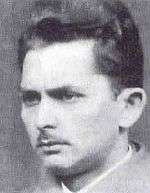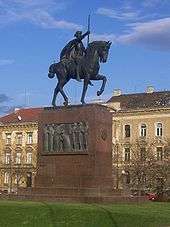Slavko Brill
Slavko Brill (1900–1943) was a Croatian Jewish sculptor and ceramics artist born in Nova Gradiška.[2][3]
Slavko Brill | |
|---|---|
 | |
| Born | 27 December 1900 |
| Died | January 1943 (aged 42) |
| Nationality | Croat |
| Occupation | Sculptor |
| Spouse(s) | Alice Brill (married 1933–1942)[1] |
He graduated in 1926 at Art Academy in Zagreb. His artistic works included portraits, busts, and cemetery monuments.[1]

After the establishment of the Independent State of Croatia, Brill converted to Catholicism. He was arrested by the Ustaše in July 1941, and then quickly released after the intercession from the Gorica utensils factory, where he was employed. In January 1942 he was arrested with his wife and incarcerated in Jasenovac concentration camp where he was forced to feature along with some other Jewish artists including Daniel Ozmo and Daniel Kabiljo in a propaganda film. Brill worked for a while in the camp's ceramics workshop. He died from tuberculosis in January 1943. His wife and her mother perished in Đakovo internment camp.[1][2][4]
Brill's works were posthumously featured in group exhibitions in Belgrade (1956–57) and Zagreb (1988, 1996 and 2000), as well as a retrospective exhibition in Zagreb in 2004. Approximately 30 of his gypsum sculptures are kept in the Glyptotheque of the Croatian Academy of Sciences and Arts, and one of his portraits is kept in the Modern Gallery, Zagreb.[1]
References
- "BRIL, Slavko (Brill, Brüll)". Židovski biografski leksikon (in Croatian). Miroslav Krleža Institute of Lexicography. Retrieved 28 June 2020.
- Goldstein (2001, pp. 327, 369)
- Mirjam Rajner Between Local and Universal: Daniel Kabiljo, a Sephardi artist in Sarajevo on the Eve of the Holocaust pdf
- Freidenreich, Harriet Pass (1979) The Jews of Yugoslavia: A Quest for Community. Philadelphia: Jewish Publication Society of America. "... Yugoslav Jewry produce a group of writers who dealt with Jewish themes, it also spawned several competent Jewish artists. ... emerged Danijel Ozmo (1912- 1942) and Danijel Kabiljo-Danilus (1894-1944), and from Zagreb, Slavko Brill."
Bibliography
- Goldstein, Ivo (2001). Holokaust u Zagrebu. Zagreb: Novi Liber. ISBN 953-6045-19-2.CS1 maint: ref=harv (link)